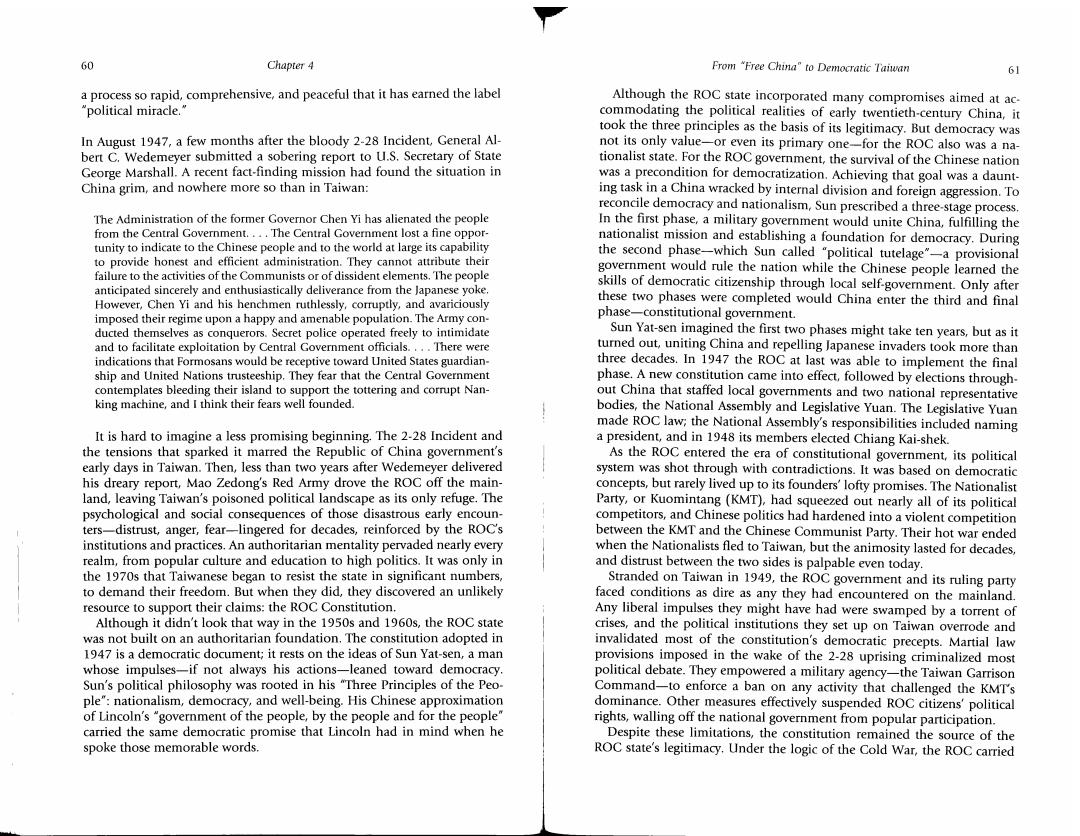
60 Chapter 4 From "Free China"to Democratic Taiwan 61 a process so rapid,comprehensive,and peaceful that it has earned the label Although the ROC state incorporated many compromises aimed at ac. “political miracle." commodating the political realities of early twentieth-century China,it took the three principles as the basis of its legitimacy.But democracy was In August 1947,a few months after the bloody 2-28 Incident,General Al- not its only value-or even its primary one-for the ROC also was a na- bert C.Wedemeyer submitted a sobering report to U.S.Secretary of State tionalist state.For the ROC government,the survival of the Chinese nation George Marshall.A recent fact-finding mission had found the situation in was a precondition for democratization.Achieving that goal was a daunt- China grim,and nowhere more so than in Taiwan: ing task in a China wracked by internal division and foreign aggression.To reconcile democracy and nationalism,Sun prescribed a three-stage process. The Administration of the former Governor Chen Yi has alienated the people In the first phase,a military government would unite China,fulfilling the from the Central Government....The Central Government lost a fine oppor- nationalist mission and establishing a foundation for democracy.During tunity to indicate to the Chinese people and to the world at large its capability to provide honest and efficient administration.They cannot attribute their the second phase-which Sun called "political tutelage"-a provisional failure to the activities of the Communists or of dissident elements.The people government would rule the nation while the Chinese people learned the anticipated sincerely and enthusiastically deliverance from the Japanese yoke. skills of democratic citizenship through local self-government.Only after However,Chen Yi and his henchmen ruthlessly,corruptly,and avariciously these two phases were completed would China enter the third and final imposed their regime upon a happy and amenable population.The Army con- phase-constitutional government. ducted themselves as conquerors.Secret police operated freely to intimidate Sun Yat-sen imagined the first two phases might take ten years,but as it and to facilitate exploitation by Central Government officials...There were turned out,uniting China and repelling Japanese invaders took more than indications that Formosans would be receptive toward United States guardian- three decades.In 1947 the ROC at last was able to implement the final ship and United Nations trusteeship.They fear that the Central Government phase.A new constitution came into effect,followed by elections through- contemplates bleeding their island to support the tottering and corrupt Nan- out China that staffed local governments and two national representative king machine,and I think their fears well founded. bodies,the National Assembly and Legislative Yuan.The Legislative Yuan made ROC law;the National Assembly's responsibilities included naming It is hard to imagine a less promising beginning.The 2-28 Incident and a president,and in 1948 its members elected Chiang Kai-shek. the tensions that sparked it marred the Republic of China government's As the ROC entered the era of constitutional government,its political early days in Taiwan.Then,less than two years after Wedemeyer delivered system was shot through with contradictions.It was based on democratic his dreary report,Mao Zedong's Red Army drove the ROC off the main- concepts,but rarely lived up to its founders'lofty promises.The Nationalist land,leaving Taiwan's poisoned political landscape as its only refuge.The Party,or Kuomintang (KMT),had squeezed out nearly all of its political psychological and social consequences of those disastrous early encoun- competitors,and Chinese politics had hardened into a violent competition ters-distrust,anger,fear-lingered for decades,reinforced by the ROC's between the KMT and the Chinese Communist Party.Their hot war ended institutions and practices.An authoritarian mentality pervaded nearly every when the Nationalists fled to Taiwan,but the animosity lasted for decades, realm,from popular culture and education to high politics.It was only in and distrust between the two sides is palpable even today. the 1970s that Taiwanese began to resist the state in significant numbers, Stranded on Taiwan in 1949,the ROC government and its ruling party to demand their freedom.But when they did,they discovered an unlikely faced conditions as dire as any they had encountered on the mainland. resource to support their claims:the ROC Constitution. Any liberal impulses they might have had were swamped by a torrent of Although it didn't look that way in the 1950s and 1960s,the ROC state crises,and the political institutions they set up on Taiwan overrode and was not built on an authoritarian foundation.The constitution adopted in invalidated most of the constitution's democratic precepts.Martial law 1947 is a democratic document;it rests on the ideas of Sun Yat-sen,a man provisions imposed in the wake of the 2-28 uprising criminalized most whose impulses-if not always his actions-leaned toward democracy. political debate.They empowered a military agency-the Taiwan Garrison Sun's political philosophy was rooted in his "Three Principles of the Peo- Command-to enforce a ban on any activity that challenged the KMT's ple":nationalism,democracy,and well-being.His Chinese approximation dominance.Other measures effectively suspended ROC citizens'political of Lincoln's "government of the people,by the people and for the people" rights,walling off the national government from popular participation carried the same democratic promise that Lincoln had in mind when he Despite these limitations,the constitution remained the source of the spoke those memorable words. ROC state's legitimacy.Under the logic of the Cold War,the ROC carried
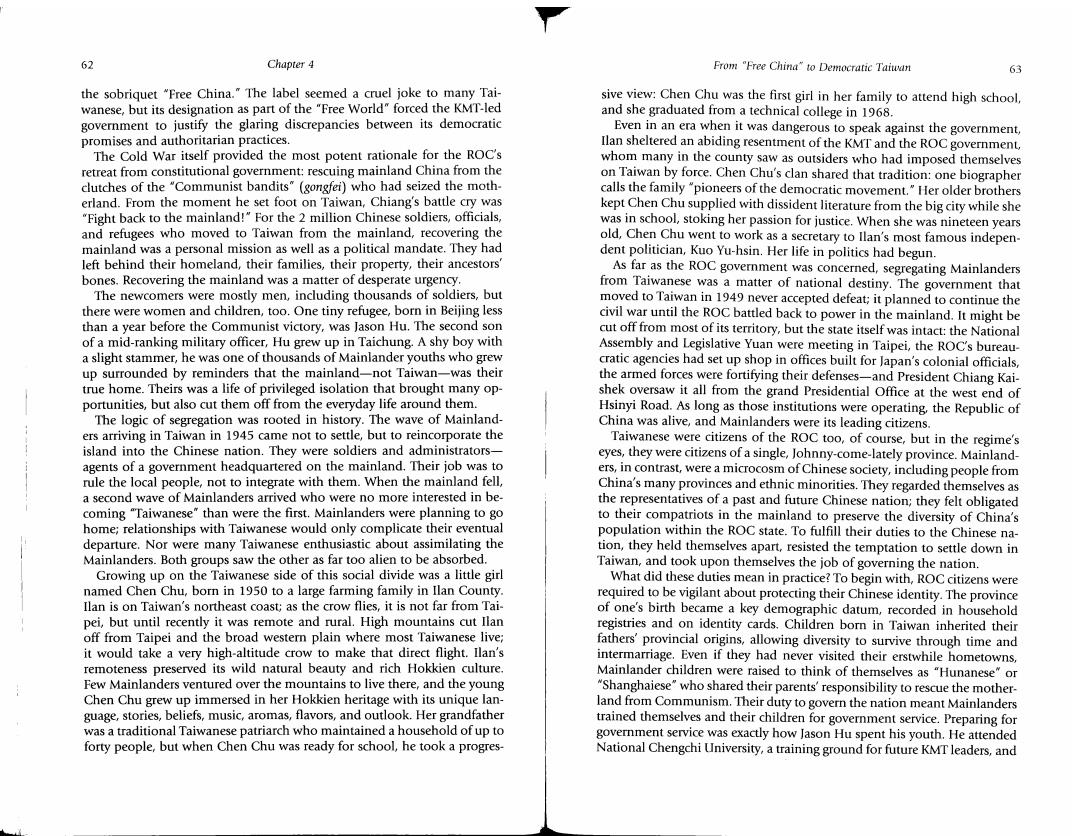
62 Chapter 4 From "Free China"to Democratic Taiwan 63 the sobriquet "Free China."The label seemed a cruel joke to many Tai- sive view:Chen Chu was the first girl in her family to attend high school, wanese,but its designation as part of the "Free World"forced the KMT-led and she graduated from a technical college in 1968. government to justify the glaring discrepancies between its democratic Even in an era when it was dangerous to speak against the government, promises and authoritarian practices. Ilan sheltered an abiding resentment of the KMT and the ROC government, The Cold War itself provided the most potent rationale for the ROC's whom many in the county saw as outsiders who had imposed themselves retreat from constitutional government:rescuing mainland China from the on Taiwan by force.Chen Chu's clan shared that tradition:one biographer clutches of the "Communist bandits"(gongfei)who had seized the moth- calls the family "pioneers of the democratic movement."Her older brothers erland.From the moment he set foot on Taiwan,Chiang's battle cry was kept Chen Chu supplied with dissident literature from the big city while she "Fight back to the mainland!"For the 2 million Chinese soldiers,officials, was in school,stoking her passion for justice.When she was nineteen years and refugees who moved to Taiwan from the mainland,recovering the old,Chen Chu went to work as a secretary to llan's most famous indepen- mainland was a personal mission as well as a political mandate.They had dent politician,Kuo Yu-hsin.Her life in politics had begun. left behind their homeland,their families,their property,their ancestors' As far as the ROC government was concerned,segregating Mainlanders bones.Recovering the mainland was a matter of desperate urgency. from Taiwanese was a matter of national destiny.The government that The newcomers were mostly men,including thousands of soldiers,but moved to Taiwan in 1949 never accepted defeat;it planned to continue the there were women and children,too.One tiny refugee,born in Beijing less civil war until the ROC battled back to power in the mainland.It might be than a year before the Communist victory,was Jason Hu.The second son cut off from most of its territory,but the state itself was intact:the National of a mid-ranking military officer,Hu grew up in Taichung.A shy boy with Assembly and Legislative Yuan were meeting in Taipei,the ROC's bureau- a slight stammer,he was one of thousands of Mainlander youths who grew cratic agencies had set up shop in offices built for Japan's colonial officials, up surrounded by reminders that the mainland-not Taiwan-was their the armed forces were fortifying their defenses-and President Chiang Kai- true home.Theirs was a life of privileged isolation that brought many op- shek oversaw it all from the grand Presidential Office at the west end of portunities,but also cut them off from the everyday life around them. Hsinyi Road.As long as those institutions were operating,the Republic of The logic of segregation was rooted in history.The wave of Mainland- China was alive,and Mainlanders were its leading citizens. ers arriving in Taiwan in 1945 came not to settle,but to reincorporate the Taiwanese were citizens of the ROC too,of course,but in the regime's island into the Chinese nation.They were soldiers and administrators- eyes,they were citizens of a single,Johnny-come-lately province.Mainland- agents of a government headquartered on the mainland.Their job was to ers,in contrast,were a microcosm of Chinese society,including people from rule the local people,not to integrate with them.When the mainland fell, China's many provinces and ethnic minorities.They regarded themselves as a second wave of Mainlanders arrived who were no more interested in be- the representatives of a past and future Chinese nation;they felt obligated coming "Taiwanese"than were the first.Mainlanders were planning to go to their compatriots in the mainland to preserve the diversity of China's home;relationships with Taiwanese would only complicate their eventual population within the ROC state.To fulfill their duties to the Chinese na- departure.Nor were many Taiwanese enthusiastic about assimilating the tion,they held themselves apart,resisted the temptation to settle down in Mainlanders.Both groups saw the other as far too alien to be absorbed. Taiwan,and took upon themselves the job of governing the nation. Growing up on the Taiwanese side of this social divide was a little girl What did these duties mean in practice?To begin with,ROC citizens were named Chen Chu,born in 1950 to a large farming family in Ilan County. required to be vigilant about protecting their Chinese identity.The province Ilan is on Taiwan's northeast coast;as the crow flies,it is not far from Tai- of one's birth became a key demographic datum,recorded in household pei,but until recently it was remote and rural.High mountains cut llan registries and on identity cards.Children born in Taiwan inherited their off from Taipei and the broad western plain where most Taiwanese live; fathers'provincial origins,allowing diversity to survive through time and it would take a very high-altitude crow to make that direct flight.Ilan's intermarriage.Even if they had never visited their erstwhile hometowns, remoteness preserved its wild natural beauty and rich Hokkien culture. Mainlander children were raised to think of themselves as "Hunanese"or Few Mainlanders ventured over the mountains to live there,and the young "Shanghaiese"who shared their parents'responsibility to rescue the mother- Chen Chu grew up immersed in her Hokkien heritage with its unique lan- land from Communism.Their duty to govern the nation meant Mainlanders guage,stories,beliefs,music,aromas,flavors,and outlook.Her grandfather trained themselves and their children for government service.Preparing for was a traditional Taiwanese patriarch who maintained a household of up to government service was exactly how Jason Hu spent his youth.He attended forty people,but when Chen Chu was ready for school,he took a progres- National Chengchi University,a training ground for future KMT leaders,and
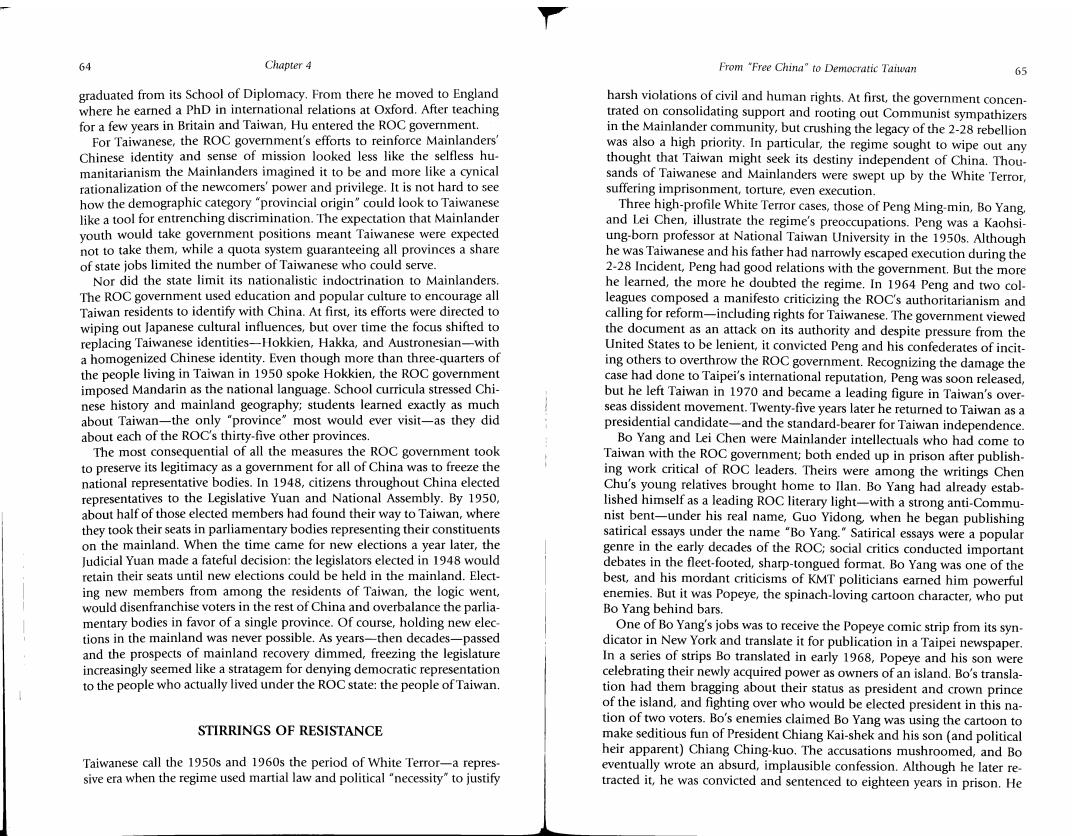
64 Chapter 4 From "Free China'to Democratic Taiwan 65 graduated from its School of Diplomacy.From there he moved to England harsh violations of civil and human rights.At first,the government concen- where he earned a PhD in international relations at Oxford.After teaching trated on consolidating support and rooting out Communist sympathizers for a few years in Britain and Taiwan,Hu entered the ROC government. in the Mainlander community,but crushing the legacy of the 2-28 rebellion For Taiwanese,the ROC government's efforts to reinforce Mainlanders' was also a high priority.In particular,the regime sought to wipe out any Chinese identity and sense of mission looked less like the selfless hu- thought that Taiwan might seek its destiny independent of China.Thou- manitarianism the Mainlanders imagined it to be and more like a cynical sands of Taiwanese and Mainlanders were swept up by the White Terror, rationalization of the newcomers'power and privilege.It is not hard to see suffering imprisonment,torture,even execution. how the demographic category "provincial origin"could look to Taiwanese Three high-profile White Terror cases,those of Peng Ming-min,Bo Yang, like a tool for entrenching discrimination.The expectation that Mainlander and Lei Chen,illustrate the regime's preoccupations.Peng was a Kaohsi- youth would take government positions meant Taiwanese were expected ung-born professor at National Taiwan University in the 1950s.Although not to take them,while a quota system guaranteeing all provinces a share he was Taiwanese and his father had narrowly escaped execution during the of state jobs limited the number of Taiwanese who could serve. 2-28 Incident,Peng had good relations with the government.But the more Nor did the state limit its nationalistic indoctrination to Mainlanders. he learned,the more he doubted the regime.In 1964 Peng and two col- The ROC government used education and popular culture to encourage all leagues composed a manifesto criticizing the ROC's authoritarianism and Taiwan residents to identify with China.At first,its efforts were directed to calling for reform-including rights for Taiwanese.The government viewed wiping out Japanese cultural influences,but over time the focus shifted to the document as an attack on its authority and despite pressure from the replacing Taiwanese identities-Hokkien,Hakka,and Austronesian-with United States to be lenient,it convicted Peng and his confederates of incit- a homogenized Chinese identity.Even though more than three-quarters of ing others to overthrow the ROC government.Recognizing the damage the the people living in Taiwan in 1950 spoke Hokkien,the ROC government case had done to Taipei's international reputation,Peng was soon released, imposed Mandarin as the national language.School curricula stressed Chi- but he left Taiwan in 1970 and became a leading figure in Taiwan's over- nese history and mainland geography;students learned exactly as much seas dissident movement.Twenty-five years later he returned to Taiwan as a about Taiwan-the only "province"most would ever visit-as they did presidential candidate-and the standard-bearer for Taiwan independence. about each of the ROC's thirty-five other provinces. Bo Yang and Lei Chen were Mainlander intellectuals who had come to The most consequential of all the measures the ROC government took Taiwan with the ROC government;both ended up in prison after publish- to preserve its legitimacy as a government for all of China was to freeze the ing work critical of ROC leaders.Theirs were among the writings Chen national representative bodies.In 1948,citizens throughout China elected Chu's young relatives brought home to Ilan.Bo Yang had already estab- representatives to the Legislative Yuan and National Assembly.By 1950, lished himself as a leading ROC literary light-with a strong anti-Commu- about half of those elected members had found their way to Taiwan,where nist bent-under his real name,Guo Yidong,when he began publishing they took their seats in parliamentary bodies representing their constituents satirical essays under the name "Bo Yang."Satirical essays were a popular on the mainland.When the time came for new elections a year later,the genre in the early decades of the ROC;social critics conducted important Judicial Yuan made a fateful decision:the legislators elected in 1948 would debates in the fleet-footed,sharp-tongued format.Bo Yang was one of the retain their seats until new elections could be held in the mainland.Elect- best,and his mordant criticisms of KMT politicians earned him powerful ing new members from among the residents of Taiwan,the logic went, enemies.But it was Popeye,the spinach-loving cartoon character,who put would disenfranchise voters in the rest of China and overbalance the parlia- Bo Yang behind bars. mentary bodies in favor of a single province.Of course,holding new elec- One of Bo Yang's jobs was to receive the Popeye comic strip from its syn- tions in the mainland was never possible.As years-then decades-passed dicator in New York and translate it for publication in a Taipei newspaper. and the prospects of mainland recovery dimmed,freezing the legislature In a series of strips Bo translated in early 1968,Popeye and his son were increasingly seemed like a stratagem for denying democratic representation celebrating their newly acquired power as owners of an island.Bo's transla- to the people who actually lived under the ROC state:the people of Taiwan. tion had them bragging about their status as president and crown prince of the island,and fighting over who would be elected president in this na- tion of two voters.Bo's enemies claimed Bo Yang was using the cartoon to STIRRINGS OF RESISTANCE make seditious fun of President Chiang Kai-shek and his son (and political heir apparent)Chiang Ching-kuo.The accusations mushroomed,and Bo Taiwanese call the 1950s and 1960s the period of White Terror-a repres- eventually wrote an absurd,implausible confession.Although he later re- sive era when the regime used martial law and political "necessity"to justify tracted it,he was convicted and sentenced to eighteen years in prison.He
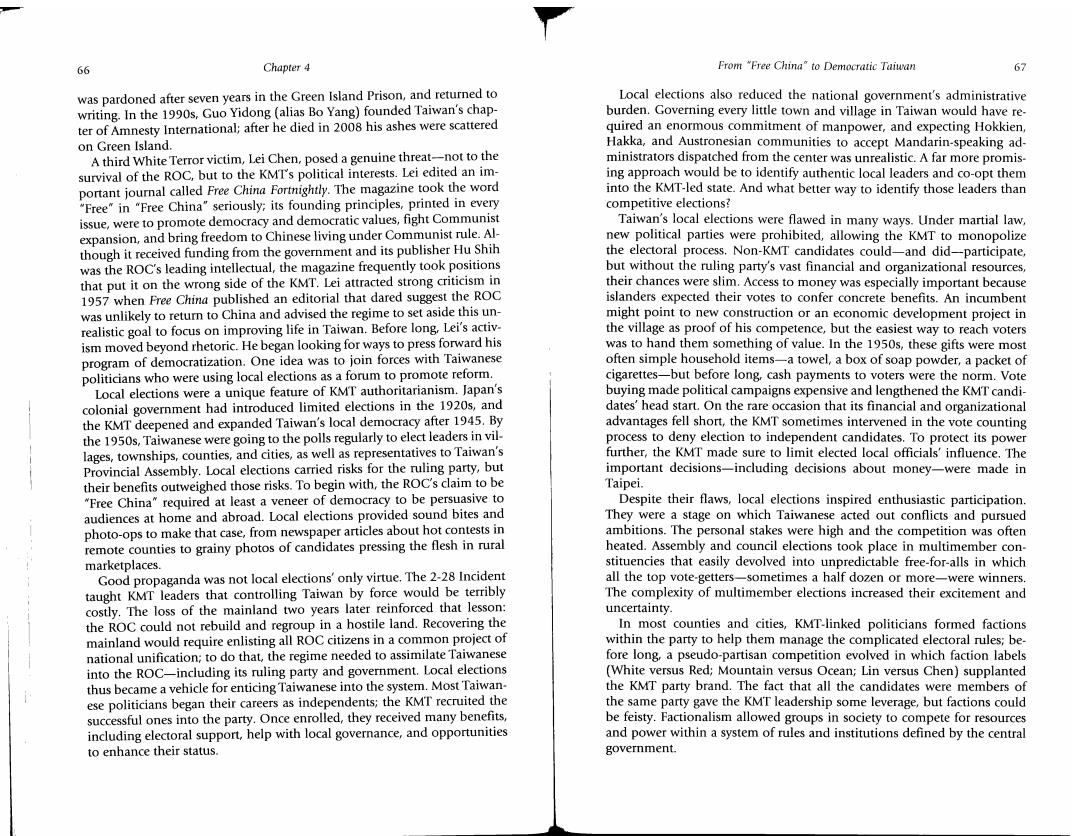
66 Chapter 4 From "Free China"to Democratic Taiwan 67 was pardoned after seven years in the Green Island Prison,and returned to Local elections also reduced the national government's administrative writing.In the 1990s,Guo Yidong (alias Bo Yang)founded Taiwan's chap- burden.Governing every little town and village in Taiwan would have re- ter of Amnesty International;after he died in 2008 his ashes were scattered quired an enormous commitment of manpower,and expecting Hokkien, on Green Island. Hakka,and Austronesian communities to accept Mandarin-speaking ad- A third White Terror victim,Lei Chen,posed a genuine threat-not to the ministrators dispatched from the center was unrealistic.A far more promis- survival of the ROC,but to the KMI's political interests.Lei edited an im- ing approach would be to identify authentic local leaders and co-opt them portant journal called Free China Fortnightly.The magazine took the word into the KMT-led state.And what better way to identify those leaders than "Free"in "Free China"seriously;its founding principles,printed in every competitive elections? issue,were to promote democracy and democratic values,fight Communist Taiwan's local elections were flawed in many ways.Under martial law, expansion,and bring freedom to Chinese living under Communist rule.Al- new political parties were prohibited,allowing the KMT to monopolize though it received funding from the government and its publisher Hu Shih the electoral process.Non-KMT candidates could-and did-participate, was the ROC's leading intellectual,the magazine frequently took positions but without the ruling party's vast financial and organizational resources, that put it on the wrong side of the KMT.Lei attracted strong criticism in their chances were slim.Access to money was especially important because 1957 when Free China published an editorial that dared suggest the ROC islanders expected their votes to confer concrete benefits.An incumbent was unlikely to return to China and advised the regime to set aside this un- might point to new construction or an economic development project in realistic goal to focus on improving life in Taiwan.Before long,Lei's activ- the village as proof of his competence,but the easiest way to reach voters ism moved beyond rhetoric.He began looking for ways to press forward his was to hand them something of value.In the 1950s,these gifts were most program of democratization.One idea was to join forces with Taiwanese often simple household items-a towel,a box of soap powder,a packet of politicians who were using local elections as a forum to promote reform. cigarettes-but before long,cash payments to voters were the norm.Vote Local elections were a unique feature of KMT authoritarianism.Japan's buying made political campaigns expensive and lengthened the KMT candi- colonial government had introduced limited elections in the 1920s,and dates'head start.On the rare occasion that its financial and organizational the KMT deepened and expanded Taiwan's local democracy after 1945.By advantages fell short,the KMT sometimes intervened in the vote counting the 1950s,Taiwanese were going to the polls regularly to elect leaders in vil- process to deny election to independent candidates.To protect its power lages,townships,counties,and cities,as well as representatives to Taiwan's further,the KMT made sure to limit elected local officials'influence.The Provincial Assembly.Local elections carried risks for the ruling party,but important decisions-including decisions about money-were made in their benefits outweighed those risks.To begin with,the ROC's claim to be Taipei. "Free China"required at least a veneer of democracy to be persuasive to Despite their flaws,local elections inspired enthusiastic participation. audiences at home and abroad.Local elections provided sound bites and They were a stage on which Taiwanese acted out conflicts and pursued photo-ops to make that case,from newspaper articles about hot contests in ambitions.The personal stakes were high and the competition was often remote counties to grainy photos of candidates pressing the flesh in rural heated.Assembly and council elections took place in multimember con- marketplaces. stituencies that easily devolved into unpredictable free-for-alls in which Good propaganda was not local elections'only virtue.The 2-28 Incident all the top vote-getters-sometimes a half dozen or more-were winners. taught KMT leaders that controlling Taiwan by force would be terribly The complexity of multimember elections increased their excitement and costly.The loss of the mainland two years later reinforced that lesson: uncertainty. the ROC could not rebuild and regroup in a hostile land.Recovering the In most counties and cities,KMT-linked politicians formed factions mainland would require enlisting all ROC citizens in a common project of within the party to help them manage the complicated electoral rules;be- national unification;to do that,the regime needed to assimilate Taiwanese fore long,a pseudo-partisan competition evolved in which faction labels into the ROC-including its ruling party and government.Local elections (White versus Red;Mountain versus Ocean;Lin versus Chen)supplanted thus became a vehicle for enticing Taiwanese into the system.Most Taiwan- the KMT party brand.The fact that all the candidates were members of ese politicians began their careers as independents;the KMT recruited the the same party gave the KMT leadership some leverage,but factions could successful ones into the party.Once enrolled,they received many benefits, be feisty.Factionalism allowed groups in society to compete for resources including electoral support,help with local governance,and opportunities and power within a system of rules and institutions defined by the central to enhance their status. government
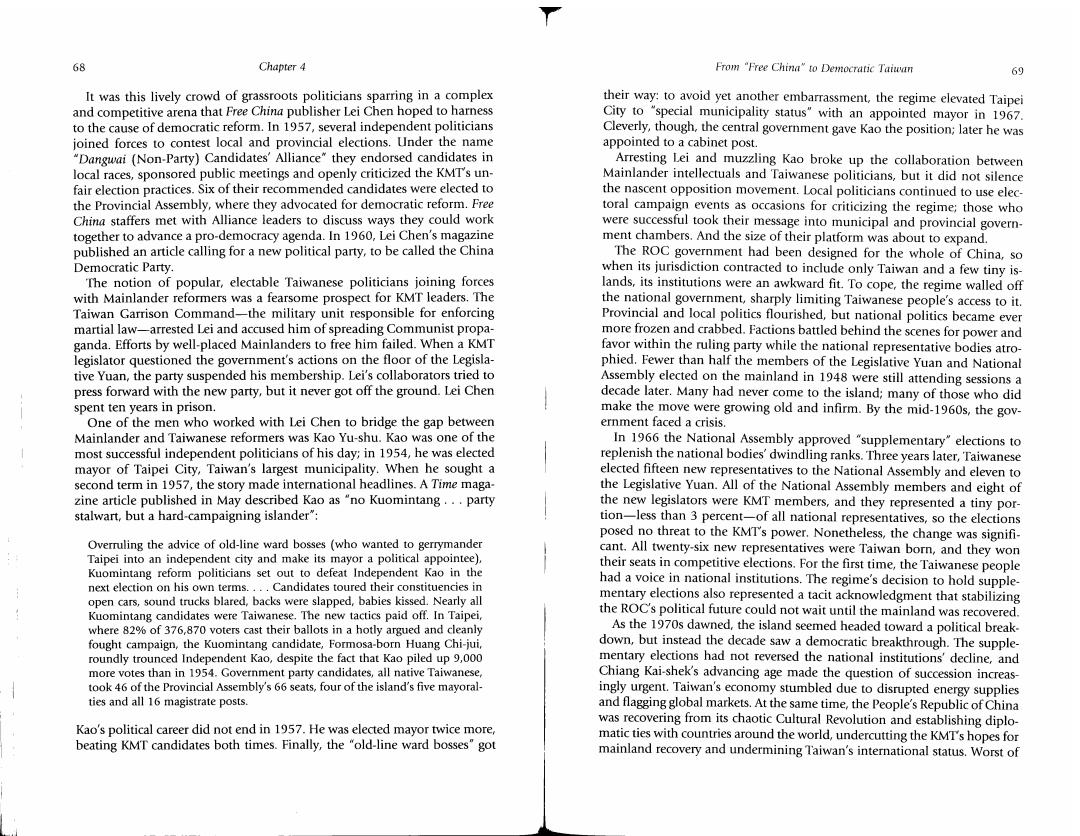
68 Chapter 4 From "Free China"to Democratic Taiwan 69 It was this lively crowd of grassroots politicians sparring in a complex their way:to avoid yet another embarrassment,the regime elevated Taipei and competitive arena that Free China publisher Lei Chen hoped to harness City to "special municipality status"with an appointed mayor in 1967. to the cause of democratic reform.In 1957,several independent politicians Cleverly,though,the central government gave Kao the position;later he was joined forces to contest local and provincial elections.Under the name appointed to a cabinet post. "Dangwai (Non-Party)Candidates'Alliance"they endorsed candidates in Arresting Lei and muzzling Kao broke up the collaboration between local races,sponsored public meetings and openly criticized the KMT's un- Mainlander intellectuals and Taiwanese politicians,but it did not silence fair election practices.Six of their recommended candidates were elected to the nascent opposition movement.Local politicians continued to use elec- the Provincial Assembly,where they advocated for democratic reform.Free toral campaign events as occasions for criticizing the regime;those who China staffers met with Alliance leaders to discuss ways they could work were successful took their message into municipal and provincial govern- together to advance a pro-democracy agenda.In 1960,Lei Chen's magazine ment chambers.And the size of their platform was about to expand. published an article calling for a new political party,to be called the China The ROC government had been designed for the whole of China,so Democratic Party when its jurisdiction contracted to include only Taiwan and a few tiny is- The notion of popular,electable Taiwanese politicians joining forces lands,its institutions were an awkward fit.To cope,the regime walled off with Mainlander reformers was a fearsome prospect for KMT leaders.The the national government,sharply limiting Taiwanese people's access to it. Taiwan Garrison Command-the military unit responsible for enforcing Provincial and local politics flourished,but national politics became ever martial law-arrested Lei and accused him of spreading Communist propa- more frozen and crabbed.Factions battled behind the scenes for power and ganda.Efforts by well-placed Mainlanders to free him failed.When a KMT favor within the ruling party while the national representative bodies atro- legislator questioned the government's actions on the floor of the Legisla- phied.Fewer than half the members of the Legislative Yuan and National tive Yuan,the party suspended his membership.Lei's collaborators tried to Assembly elected on the mainland in 1948 were still attending sessions a press forward with the new party,but it never got off the ground.Lei Chen decade later.Many had never come to the island;many of those who did spent ten years in prison. make the move were growing old and infirm.By the mid-1960s,the gov- One of the men who worked with Lei Chen to bridge the gap between ernment faced a crisis. Mainlander and Taiwanese reformers was Kao Yu-shu.Kao was one of the In 1966 the National Assembly approved "supplementary"elections to most successful independent politicians of his day;in 1954,he was elected replenish the national bodies'dwindling ranks.Three years later,Taiwanese mayor of Taipei City,Taiwan's largest municipality.When he sought a elected fifteen new representatives to the National Assembly and eleven to second term in 1957,the story made international headlines.A Time maga- the Legislative Yuan.All of the National Assembly members and eight of zine article published in May described Kao as "no Kuomintang...party the new legislators were KMT members,and they represented a tiny por- stalwart,but a hard-campaigning islander": tion-less than 3 percent-of all national representatives,so the elections posed no threat to the KMT's power.Nonetheless,the change was signifi- Overruling the advice of old-line ward bosses (who wanted to gerrymander Taipei into an independent city and make its mayor a political appointee). cant.All twenty-six new representatives were Taiwan born,and they won Kuomintang reform politicians set out to defeat Independent Kao in the their seats in competitive elections.For the first time,the Taiwanese people next election on his own terms....Candidates toured their constituencies in had a voice in national institutions.The regime's decision to hold supple- open cars,sound trucks blared,backs were slapped,babies kissed.Nearly all mentary elections also represented a tacit acknowledgment that stabilizing Kuomintang candidates were Taiwanese.The new tactics paid off.In Taipei, the ROC's political future could not wait until the mainland was recovered. where 82%of 376,870 voters cast their ballots in a hotly argued and cleanly As the 1970s dawned,the island seemed headed toward a political break- fought campaign,the Kuomintang candidate,Formosa-born Huang Chi-jui, down,but instead the decade saw a democratic breakthrough.The supple- roundly trounced Independent Kao,despite the fact that Kao piled up 9,000 mentary elections had not reversed the national institutions'decline,and more votes than in 1954.Government party candidates,all native Taiwanese, Chiang Kai-shek's advancing age made the question of succession increas- took 46 of the Provincial Assembly's 66 seats,four of the island's five mayoral- ingly urgent.Taiwan's economy stumbled due to disrupted energy supplies ties and all 16 magistrate posts. and flagging global markets.At the same time,the People's Republic of China was recovering from its chaotic Cultural Revolution and establishing diplo- Kao's political career did not end in 1957.He was elected mayor twice more, beating KMT candidates both times.Finally,the "old-line ward bosses"got matic ties with countries around the world,undercutting the KMT's hopes for mainland recovery and undermining Taiwan's international status.Worst of